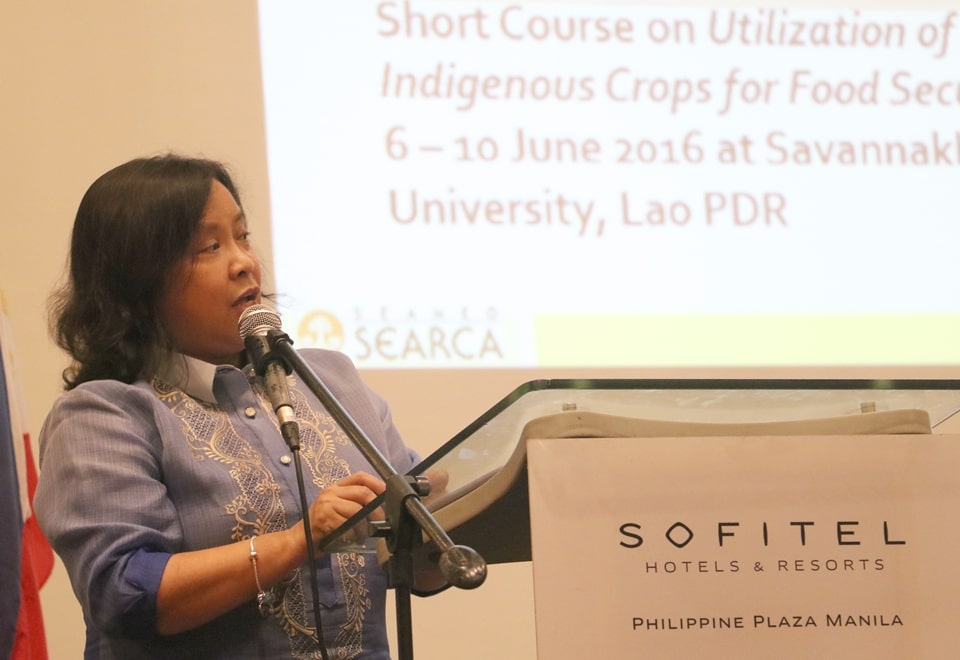
MANILA, Philippines – The Southeast Asian Regional Center for Graduate Study and Research in Agriculture (SEARCA) shared the unique qualities of its graduate scholarship program at the 14th Annual Meeting and Scientific Convention of the Outstanding Young Scientists, Inc. (OYSI) held on 9 July 2019. The convention theme was "Philippines Got Talents: Sustainable Education, Talent Retention, and Development."
Dr. Maria Cristeta N. Cuaresma, SEARCA Program Head for Graduate Education and Institutional Development, talked about "Building Talents and Capabilities in Southeast Asia towards Agricultural and Rural Development."
Speaking before a gathering of OYSI members who include Dr. Glenn B. Gregorio, SEARCA Director, Dr. Cuaresma discussed SEARCA's capacity building initiatives, most of which are under its core program on Graduate Education and Institutional Development.
SEARCA's capacity building efforts include graduate scholarships with 1,789 grants awarded to Southeast Asians and another 29 grants given to nationals of countries outside the region. Some of the scholarship grants were jointly awarded with partner institutions that have similar interest to build a strong cadre of professionals working for agricultural and rural development in the region.
Aside from receiving funds for roundtrip travel from their home to the study post, tuition, book allowance, life and health insurance, living allowance, and thesis budget, SEARCA scholars also get supported when they present papers in scientific conferences or publishes in journals.
For those enrolled at University of the Philippines Los Banos (UPLB) where SEARCA is based, most of the SEARCA scholars reside at a SEARCA dormitory on campus and get discounted rates.
Moreover, Dr. Cuaresma revealed that foreign scholars enrolled in the Philippines enjoy the privilege of being issued 9E(2) visas, intended for officers of foreign governments, an agreement inked by SEARCA with the Department of Foreign Affairs.
"SEARCA arranges for the issuance of the scholar's visa and its extension and scholars do not pay any fees. This privilege is even extended to their immediate family members," she said.
To further build the scholars' capacities and assist them in completing their studies on time, SEARCA also provides customized trainings and fly in scholars enrolled in study posts overseas so they could avail of these services.
"Every year, we offer trainings on English Enhancement, on Writing Thesis Proposals, and on Experimental Designs and Data Analysis. From time to time, we also offer leadership or other relevant trainings, according to what the scholars need," Dr. Cuaresma explained.
After graduation, SEARCA continues to support its scholars as scholarship alumni, who are given priority in SEARCA's other grants (e.g., travel grants, Seed Fund for Research and Training, or support to participate in SEARCA learning events).
Dr. Cuaresma said these alumni are organized into a Regional SEARCA Alumni Association with country chapters across the region. They conduct biennial conferences and collaborate in other activities, such as the recently concluded book writing project. They now plan to work on a collaborative research as an alumni group.
Strong network of universities
SEARCA counts among its strong suits the Southeast Asian University Consortium for Graduate Education in Agriculture and Natural Resources (UC) that it established in 1989 to link leading agricultural universities in Southeast Asia. The five founding members became regular study posts of SEARCA scholars. These are Institut Pertanian Bogor (IPB) and Universitas Gadjah Mada (UGM) in Indonesia, Universiti Putra Malaysia (UPM), Kasetsart University (KU) in Thailand, and UPLB.
The UC provides funds for Consortium students and staff to travel to other Consortium member universities to do research, present in conferences, attend courses or trainings for students or serve as visiting lecturer for a limited period.
According to Dr. Cuaresma, since 2015, the UC has also conducted annual activities to further enhance students' capacities and strengthen partnerships within the Consortium.
"One is the annual UC Summer School which has now evolved into a two-unit credit earning course that uses the transdisciplinary approach to assess sustainability transitions in agriculture production and food processing systems at the grassroot level. Another is the UC Graduate Forum where students present their research results and establish linkages with students from other UC member universities. These activities are being hosted by members of the Consortium on rotation basis," she said.
In 2013, the UC members agreed to collaborate in undertaking joint graduate degree courses and dual degree programs. KU and UPM have since implemented dual research degree programs in both Master's and PhD levels in areas related to agriculture.
After forging a partnership with Agrinatura, a consortium of European universities, the UC submitted a proposal to ERASMUS+ under its Capacity Building for Higher education component, and got funded to establish a Joint Master of Science degree in Food Security and Climate Change at the consortium level.
"This has brought the capacity building activities of the consortium to a higher level, from merely awarding grants, to developing and conducting joint courses, forums and also degree programs," Dr. Cuaresma said.
Institutional development assistance
SEARCA also assists strategically located universities to empower and equip them with the necessary resources to meet the demands required to boost economic development in the region. Five universities have become partner-beneficiaries in this effort, one each located in Cambodia, Lao PDR, Myanmar, Timor- Leste, and Vietnam.
Dr. Cuaresma explained that "since different institutions have different structures, systems, and resources, the assistance vary according to the needs of the university, from the conduct of an institutional review to fielding of experts to develop curricula or training modules, or in capacitating staff through educational support interventions, such as in-house trainings or scholarships."
SEARCA also draws in partners to help in this institutional development assistance program, with much of the help coming from the Food Security Center (FSC) of the University of Hohenheim, Germany. FSC has provided funds to bring in experts to conduct in-house trainings and short courses in the participating universities.
